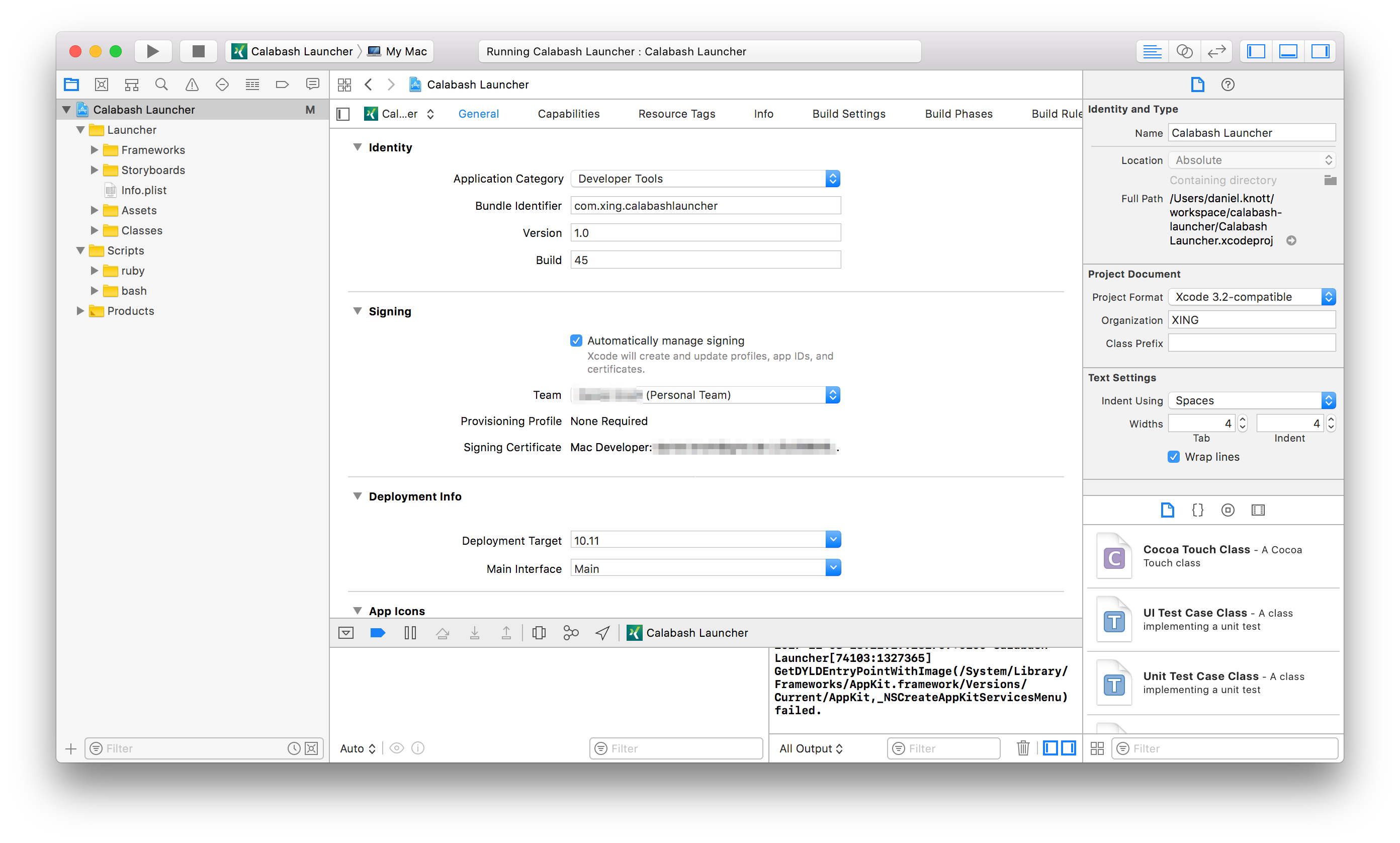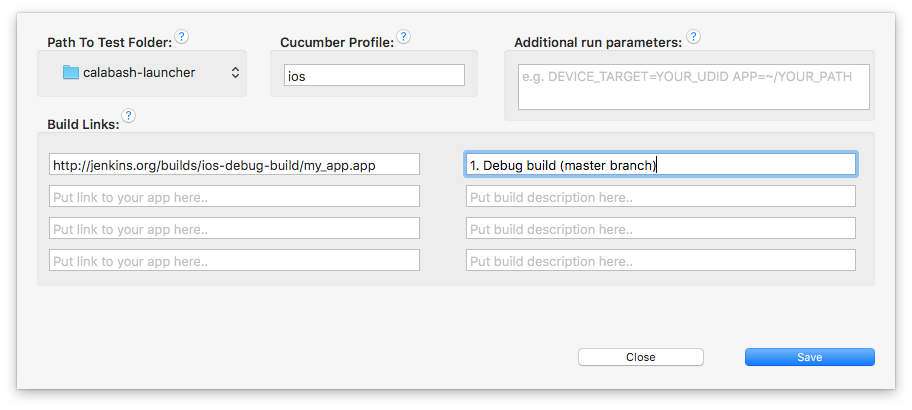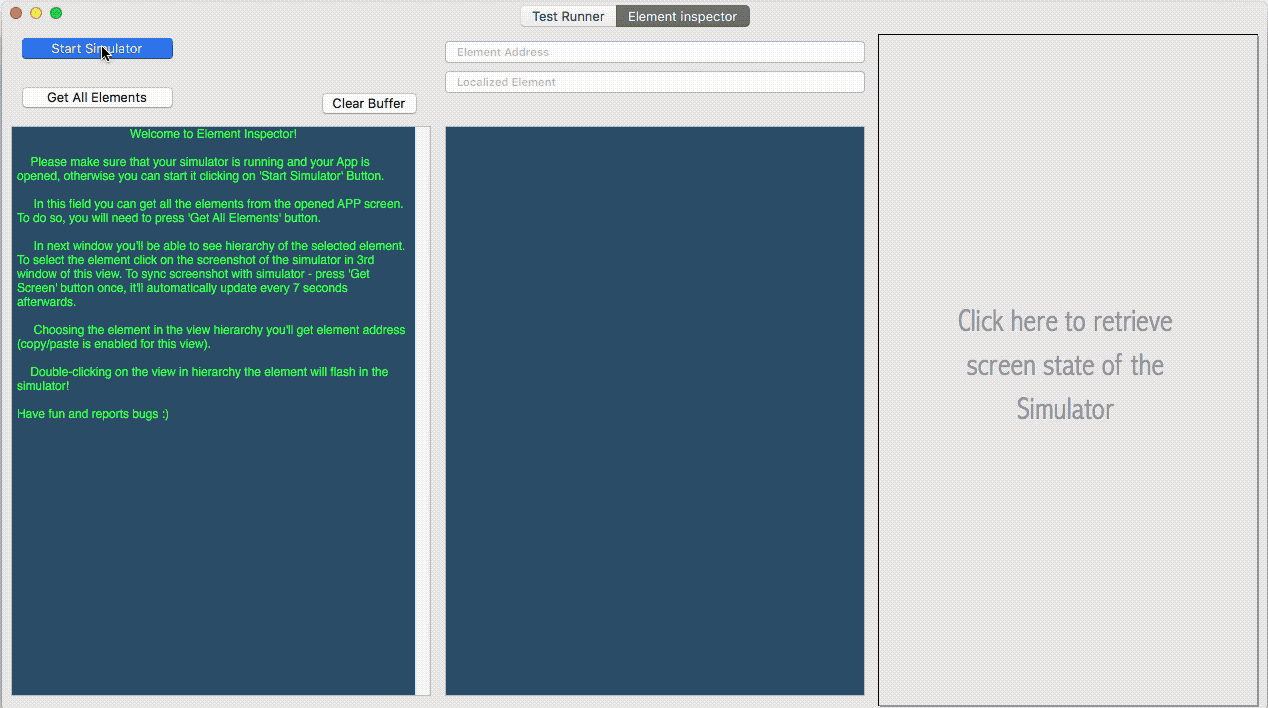Awesome
Calabash Launcher
Calabash Launcher is a macOS app that helps you run and manage Calabash iOS tests on your Mac.
- Instead of having to run and configure test runs in console, you can use a simple user interface which helps you to pick up needed devices, languages, tags, builds and other parameters.
- Instead of having to search elements by quering view hierarchy again and again, you can click on the element under search and get its class name, accessibility label and/or accessibility id.
Test Runner
The Test Runner runs tests on a variety of configurations. It supports:
- Running tests on a simulator
- Running tests on a physical device
- Running tests in different languages
- Test tags
- Console output
Element Inspector
With the Element Inspector you can inspect your apps view hierarchy to get elements query strings in hierarchy tree representation.
It supports:
- Device element highlighting
- Accessing an element's address
- Accessing an element's localized object (by reading all .strings and .json files in the project)
- The visual representation of the device
Project Status
This project is under active development, and it is heavily used at XING SE.
Prerequisites
In order to run the application you have to make sure that your machine meets the following requirements.
- MacOS Sierra or newer
- Xcode 9.0 or newer
- iOS Simulators >= 10.1
- Ruby >= 2.2.0 (2.3.1 is preferred)
bundler>= 1.15.0calabash-ios>= 0.20.5
Xcode Configuration
After you have cloned the project to your mac, open the project in Xcode. Before you start to build the project you need to add a developer team to the project. Use your Apple ID to sign in and to create a personal team.

Once the team is added, hit the build button and the calabash launcher will start in a few seconds.
Using the Test Runner
When opening Calabash Launcher the first time, it will ask you to give the path to the repository with your Calabash tests and (optionally) your Cucumber profile.

Provide the required data and press save. After a restart of the Calabash Launcher, you will be able to configure your testrun by choosing a simulator, the language and the Cucumber tag to execute.

Running on physical devices
To run tests on physical devices, the device's IP and app's bundle ID should be provided in the device configuration dialog:
Using the Element Inspector
⚠️ Currently the Element Inspector is limited to iPhone 6, iPhone 7 and iPhone 8. Please make sure that one of these devices is launched when you search for elements. ⚠️

- Clicking on the right window in the view will sync the Inspector with the simulator (and it will be automatically synced every 5 seconds)
- Clicking on an element in the synchronised window will show the element's
class,accessibility idandaccessibility label. - Clicking on a nested menu of an element will show you the element hierarchy.
Troubleshooting
- Calabash Launcher will not work if you cannot run
bundle exec calabash-ios consolefrom your terminal. Sometimes the problem could live in the Ruby installation and/or conflicts withreadline. To fix the problem, please re-install Ruby. - You can reset Calabash Launcher's settings via the
Reset to Defaults Settingsmenu item.
Contributing
Want to help improving Calabash Launcher? We could really use your help!
Open source isn't just writing code. You can help by doing any of the following:
- Reporting bugs
- Reviewing pull requests
- Bringing ideas for the new features
- Answering questions on issues
- Documentation improvements
- Fixing bugs
- Adding new features
This project is intended to be a safe, welcoming space for collaboration, and contributors are expected to adhere to the Contributor Covenant code of conduct.
License
Calabash Launcher is released under an MIT license. See LICENSE for more information.